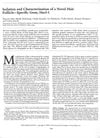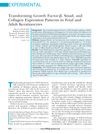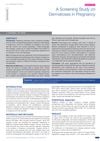 27 citations,
December 2015 in “Mayo Clinic Proceedings”
27 citations,
December 2015 in “Mayo Clinic Proceedings” The document concludes that lifestyle changes and medical treatments can significantly reduce symptoms of Hidradenitis Suppurativa, a chronic skin condition.
 25 citations,
May 1994 in “Journal of Investigative Dermatology”
25 citations,
May 1994 in “Journal of Investigative Dermatology” Researchers found a new gene, hacl-1, that is active in mouse hair follicles during hair growth and may be important for hair biology.
 24 citations,
October 2014 in “Cold Spring Harbor Perspectives in Medicine”
24 citations,
October 2014 in “Cold Spring Harbor Perspectives in Medicine” Genetic research has advanced our understanding of skin diseases, but complex conditions require an integrative approach for deeper insight.
 23 citations,
February 2014 in “Journal of Pediatric and Adolescent Gynecology”
23 citations,
February 2014 in “Journal of Pediatric and Adolescent Gynecology” Low-dose finasteride reduces excessive hair growth in teenage girls safely and affordably.
 22 citations,
May 1999 in “International Journal of Dermatology”
22 citations,
May 1999 in “International Journal of Dermatology” Hair loss from genetics and hormones can be treated with drugs or surgery.
 17 citations,
June 2017 in “Gene”
17 citations,
June 2017 in “Gene” A rare genetic mutation found in an Indian family can be detected through prenatal screening.
 17 citations,
March 2006 in “Journal of Cosmetic Dermatology”
17 citations,
March 2006 in “Journal of Cosmetic Dermatology” Hormonal changes during and after pregnancy can cause hair growth changes and hair loss, with treatments available for some conditions.
 16 citations,
February 2007 in “Plastic and Reconstructive Surgery”
16 citations,
February 2007 in “Plastic and Reconstructive Surgery” Keratinocytes show more TGF-β system activity and collagen production as they age, which might affect wound scarring.
 15 citations,
March 1997 in “International Journal of Dermatology”
15 citations,
March 1997 in “International Journal of Dermatology” Finasteride shows promise for treating hair loss and excessive hair growth, but more research is needed to confirm its effectiveness and safety.
 14 citations,
November 2008 in “Expert opinion on drug metabolism & toxicology”
14 citations,
November 2008 in “Expert opinion on drug metabolism & toxicology” Finasteride helps treat prostate issues and may prevent prostate cancer in high-risk men.
 11 citations,
May 2003 in “Obstetrics and gynecology (New York. 1953. Online)/Obstetrics and gynecology”
11 citations,
May 2003 in “Obstetrics and gynecology (New York. 1953. Online)/Obstetrics and gynecology” Hirsutism in women often indicates a hormonal imbalance and can be managed with a combination of hormonal treatments and hair removal methods.
 9 citations,
January 2017 in “Journal of Clinical and Diagnostic Research”
9 citations,
January 2017 in “Journal of Clinical and Diagnostic Research” Most pregnant women experience skin changes, mainly increased pigmentation, and some develop pregnancy-related skin conditions and infections.
 9 citations,
September 2000 in “Obstetrics and gynecology clinics of North America”
9 citations,
September 2000 in “Obstetrics and gynecology clinics of North America” Hirsutism causes significant psychological distress in women.
 7 citations,
October 2015 in “American Journal of Primatology”
7 citations,
October 2015 in “American Journal of Primatology” Monkeys with hair loss during pregnancy showed higher stress hormone levels and invested differently in their offspring.
 7 citations,
September 2013 in “Current Dermatology Reports”
7 citations,
September 2013 in “Current Dermatology Reports” Some skin medications are safe for pregnant women, but others pose risks or should not be used.
 5 citations,
May 2017 in “Current Opinion in Pediatrics”
5 citations,
May 2017 in “Current Opinion in Pediatrics” Hormonal therapies are safe and effective for treating acne in female adolescents, with specific treatments for those with endocrine disorders.
 5 citations,
February 2010 in “Expert Review of Dermatology”
5 citations,
February 2010 in “Expert Review of Dermatology” Treating both the mind and skin together, especially by managing stress, can greatly improve outcomes for skin disorders linked to psychological issues.
 4 citations,
August 2010 in “Acta Biologica Hungarica”
4 citations,
August 2010 in “Acta Biologica Hungarica” New steroidal compounds moderately block an enzyme related to testosterone conversion, less effectively than finasteride.
 3 citations,
February 2018 in “InTech eBooks”
3 citations,
February 2018 in “InTech eBooks” Traditional Chinese Medicine and acupuncture may improve Polycystic Ovarian Syndrome symptoms and reduce costs, but more research is needed.
 3 citations,
January 2001 in “Cambridge University Press eBooks”
3 citations,
January 2001 in “Cambridge University Press eBooks” Finasteride effectively treats hair loss and enlarged prostate in men, with mild side effects.
 2 citations,
June 2022 in “International Journal of Biomedicine”
2 citations,
June 2022 in “International Journal of Biomedicine” The review suggests a comprehensive approach to treat hirsutism, focusing on hair removal, medication, and managing emotional effects.
 2 citations,
November 2012 in “InTech eBooks”
2 citations,
November 2012 in “InTech eBooks” The document concludes that sex hormones are crucial for mammalian reproduction, health, and behavior, and require more research for therapeutic use.
 1 citations,
April 2017 in “Journal of Dermatology and Dermatologic Surgery”
1 citations,
April 2017 in “Journal of Dermatology and Dermatologic Surgery” IVIG therapy was linked to hair regrowth in two patients with hair loss, but it's not recommended due to its risks and costs.
 1 citations,
January 2013 in “Elsevier eBooks”
1 citations,
January 2013 in “Elsevier eBooks” The document reviews various hair and nail disorders, their causes, and treatments, emphasizing the need for proper diagnosis and the link between nail changes and systemic diseases.
 1 citations,
October 2010 in “Cambridge University Press eBooks”
1 citations,
October 2010 in “Cambridge University Press eBooks” Hormonal therapies are effective for managing hair and skin symptoms in women with PCOS.

Toxoplasma gondii infection may increase testosterone levels in males.
 June 2022 in “International Journal of Health Sciences (IJHS) (En línea)”
June 2022 in “International Journal of Health Sciences (IJHS) (En línea)” Pregnant women with hair loss often have low zinc and iron levels.
January 2019 in “The Pharma Innovation Journal” The best mix for a hair loss treatment cream is 10% Sophora japonica tincture and 5% Serenoa repens extract.

Different connective tissue disorders have unique symptoms and treatments, with varying outcomes and often require ongoing care from a specialist.
 August 2009 in “Expert Review of Dermatology”
August 2009 in “Expert Review of Dermatology” Pregnancy can cause skin changes and conditions that need correct diagnosis and treatment for the health of the mother and baby.





























